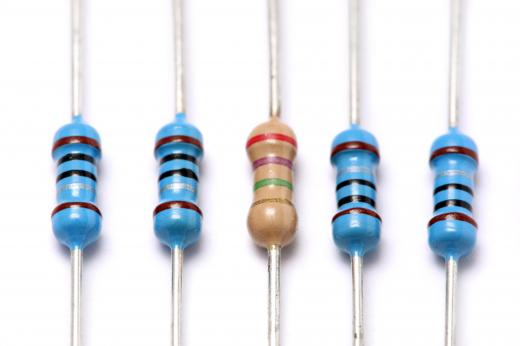What is a Mohm?
The term mohm has multiple meanings, depending on what the 'm' stands for. In some cases, the m is a prefix used before -ohm, and stands for 'milli-' or 'mega-'. Mohm may also be the abbrevation for mobile ohm, a unit used to measure the mobility of sound waves.
When mohm refers to milliohm or megaohm, the ohm is a mechanical ohm, which measures electrical resistance. In this context, resistance refers to how much a material opposes the flow of electrical current. One ohm is equal to the amount of resistance incurred when 1 volt of electromotive force produces 1 Ampere of electrical current. A milliohm, written as mohm or mΩ, is one thousandth of one ohm, while a megaohm, written as Mohm or MΩ, is one million ohms.

Milliohms are the units of measurement used for objects which have very low resistance. Milliohm meters can be used to test batteries, especially the batteries of small electronic devices, which are designed to have low resistances. Batteries with lower resistance hold charge longer, since there is less force resisting the flow of current. The resistance of capacitors, devices which store electrical charge, is also frequently measured in milliohms, since capacitors with lower resistivity are more efficient.
Megaohms are used as the units of measurement for objects with very high resistance. They are often used to test insulation, which should have a high resistance in order to minimize temperature changes in whatever is being insulated. The quality of distilled water is also measured using megaohms. Distilled water quality ranges from 1 to 18 megaohms, with higher resistances indicating higher quality. The quality of distilled water is important in the manufacturing process for semiconductors and other electrical parts.
Mobile ohms measure the mechanical mobility of sound waves. A mobile ohm is the reciprocal of a mechanical ohm. In other words, one divided by the number of mechanical ohms gives the number of mobile ohms. While a mechanical ohm measures resistance, a mobile ohm measures the inverse of resistance, called conductance, so a higher measurement in mobile ohms means that sounds waves can move more easily.
Siemens is the most commonly used term for the measure of conductance indicated by mobile ohms. The unit was originally called mho — ohms spelled backward — because it was the inverse of ohms, and mho is still sometimes used. Mobile ohm or mohm is probably the least commonly used term for this measurement.
AS FEATURED ON:
AS FEATURED ON:











Discussion Comments
@CharlieB - It can seem confusing at first, but try to relate it to water and a dam on a river. The water is coming down the river, then it hits the dam, which is the resistance. If the floodgates of the dam are only partially opened, that would be high resistance -- not much water can get through the dam. However, if all the floodgates are opened wide, and the water is flowing freely, that would be low resistance -- the water is free to go as it pleases because there is not much stopping it.
Resistors in electronic devices act as in the same way as a dam: They control the flow of electricity going through the device. If the electricity were free to flow on its own, it would burn out the device. By controlling the flow of electricity with a resistor, the dam, only the amount of electricity needed goes to the device. That allows it to function the way it was designed to without burning out.
By the way, here's a freebie for you: The charge the device needs from the electricity is stored in the capacitor.
I see that resistance is being discussed in this article, and I'm a little uncertain as to what it is in regard to electronics. How does resistance relate to resistors? I don't mean to sound simplistic, but to a novice, it does seem complicated. Maybe it's just the terminology that's confusing me. Any help?
Post your comments